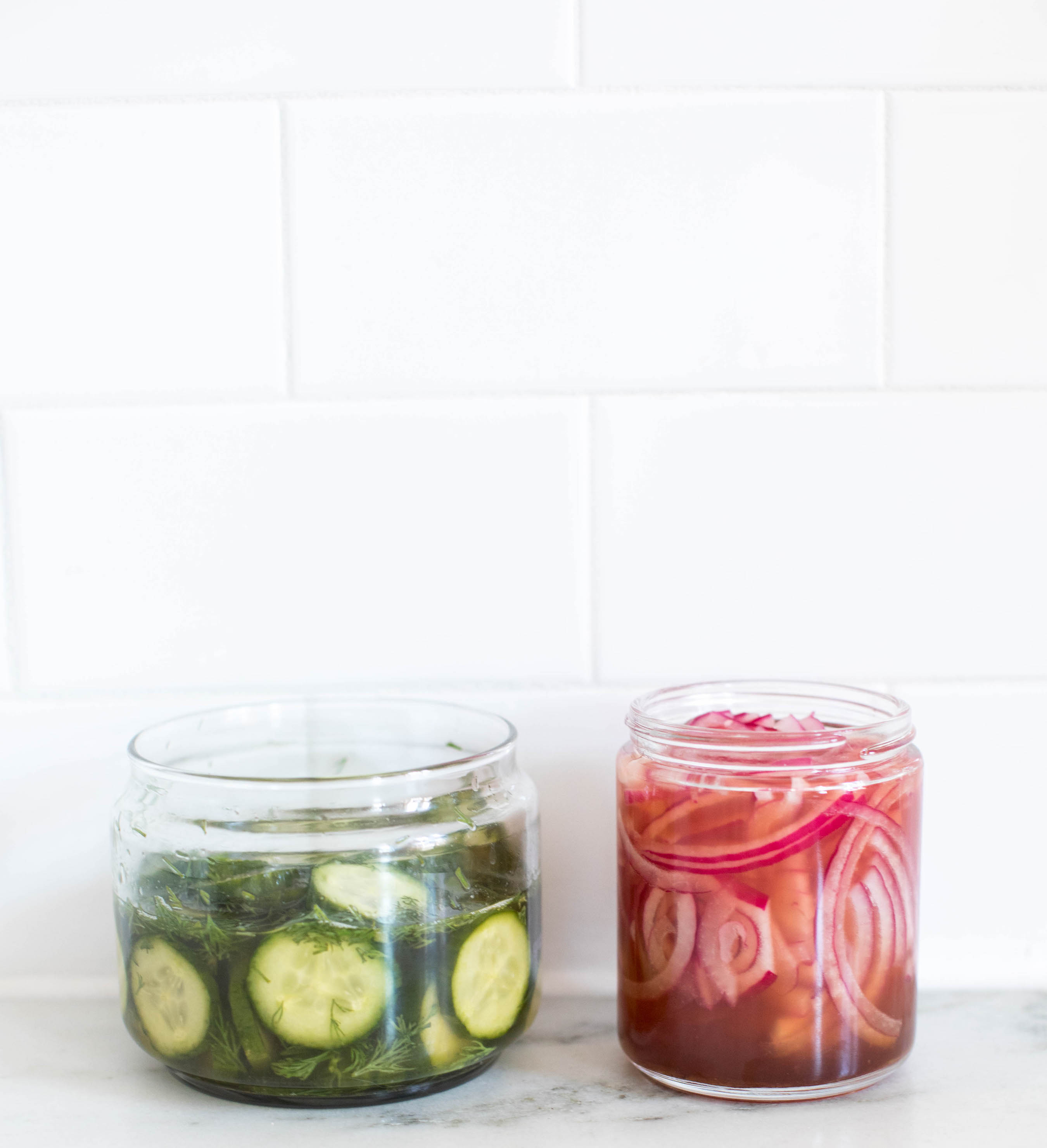Fermented foods have been enjoying some well-deserved time in the spotlight lately.
Not only are these probiotic-packed superfoods brimming with beneficial bacteria, but they’re also versatile and full of flavor. Making a conscious effort to include just a few servings in your diet each week can have a huge impact on gut health, weight management, blood sugar levels, and more.
Ready to learn more? Keep reading for a complete fermented foods list, plus some simple yet delicious ways to add them to your diet.
What Are Fermented Foods?
Fermentation is a process in which microorganisms like bacteria and yeast break down molecules such as sugar. This process triggers a number of different chemical changes. Most notably, however, it extends the shelf-life of the final product and increases the number of beneficial bacteria in your food.
“Bacteria” and “food” aren’t two words you would ever really expect–or want–to hear in the same sentence, but this type of bacteria is actually pretty important to your overall health. Also known as probiotics, these healthy strains of bacteria live in your digestive tract and promote everything from digestive health to immune function and beyond (1).
Taking a probiotic is one easy way to increase your intake of gut-healthy bacteria. However, you don’t need to spend lots of money on pricey products to get more probiotics in your diet. In fact, incorporating a few of the top fermented foods into your weekly meal plan can be just as effective, and may even offer other health benefits as well.
Top 9 Fermented Foods
From pickled veggies to cultured dairy products, there are tons of different ways to get more fermented foods into your diet. Here are a few of the top fermented foods that you may want to consider adding to your next grocery list.
1. Kombucha
Kombucha is a fermented beverage made from either black or green tea. It’s typically fizzy and sharp, with a flavor that can range from sour to sweet depending on the way that it’s produced and the ingredients that are added to it.
Although research is limited in humans, animal and test-tube models show that kombucha could help decrease blood sugar, reduce cholesterol and triglyceride levels, and block the spread of cancer cells in vitro (2, 3).
Not only that, but kombucha is also incredibly versatile. It makes a great alternative to soda or other sugary drinks and can even be brewed at home using tea, sugar, and a SCOBY—also known as a “symbiotic culture of bacteria and yeast.”
2. Sauerkraut
Sauerkraut is tasty fermented food with a long history of health benefits. Although it originated in ancient China over 2,000 years ago, sauerkraut has since become a popular side dish popping up all over the globe.
Traditionally, fermented sauerkraut is made from raw cabbage combined with lactic acid bacteria. In some regions, it’s also flavored with ingredients like caraway seeds, juniper berries, ginger, beets, dill, or fennel.
In addition to supplying the same health benefits as other fermented foods, sauerkraut also provides a hearty dose of vitamin C, vitamin K, iron, and manganese (4). Plus, making sauerkraut is easy and can be done right from the comfort of your own kitchen.
To make homemade sauerkraut, simply combine grated cabbage with salt, and your choice of other veggies like beets, carrots, and ginger. Pack into a sterilized jar and set at room temperature for 2-3 weeks to allow fermentation to occur.
3. Kefir
Kefir is a type of fermented milk drink that has been linked to a long list of benefits. This cultured dairy product is made by combining kefir grains with milk to produce a creamy, flavorful beverage that’s packed with probiotics.
Kefir is a great source of several important nutrients, including protein, phosphorus, calcium, and vitamin B12, all of which play a central role in overall health (5). Additionally, kefir is low in lactose, which means that consuming a kefir drink is likely to be more well-tolerated than regular milk for those with lactose intolerance (6). In animal studies, kefir has also been shown to reduce inflammation and possess anti-allergic properties, indicating that it could be useful in the treatment of conditions like asthma (7).
Aside from kefir milk, there are plenty of other options for enjoying this delicious, gut-friendly drink. Goat milk kefir, kefir cheese, and kefir yogurt, for example, are widely available as an alternative to traditional dairy products. Meanwhile, coconut milk kefir or water kefir are two popular alternatives for those following a dairy-free or plant-based diet.
4. Tempeh
Tempeh is a popular fermented soy product that is often considered a staple in vegetarian and vegan diets alike. It’s comprised of fermented soybeans that have been pressed into a dense, compact cake that is high in protein, probiotics, and important micronutrients like iron, calcium, and riboflavin (8).
Besides being high in disease-fighting antioxidants, tempeh is also loaded with soy isoflavones. These powerful compounds have been shown to decrease cholesterol levels, fight oxidative stress, and boost bone health (9, 10, 11).
Tempeh is also incredibly versatile and makes a great addition to wraps, sandwiches, stir-fries, salads and more.
5. Natto
Although it hasn’t reached peak popularity in the western world, natto beans rank as one of the top fermented foods in Asian countries like Japan. Like tempeh, natto is made from fermented soybeans and is a great source of several key nutrients, including protein, manganese, iron, and copper (12).
While many are unaccustomed to its unique smell, taste, and texture, and aroma, natto has been tied to several impressive health benefits. In particular, natto contains an enzyme called nattokinase, which has been shown to reduce blood pressure and protect against blood clots (13, 14).
6. Pickles
As one of the most common fermented vegetables, pickles are available on supermarket shelves across the country. Pickles are made up of cucumbers soaked in salty water, which allows them to ferment and boosts their content of gut-friendly probiotics.
Keep in mind that the kosher dill pickles soaked in vinegar at most grocery stores don’t carry the same probiotic benefits as the fermented pickles soaked in brine. Try making your own at home or look for pickles without vinegar at your local health food store to maximize the potential health benefits.
7. Kimchi
Serving as a staple in Korean cuisine, vegan kimchi is favored for its delicious flavor and versatility. It’s made from salted and fermented veggies that have been seasoned with herbs and spices like garlic, ginger, and scallions. There are also several different types available, including cucumber, carrot, cabbage, or radish kimchi.
In addition to giving a spicy kick to dishes, kimchi has also been linked to several health benefits. For example, one study conducted by the Pusan National University in Korea found that eating kimchi for seven days led to significant reductions in cholesterol levels and blood sugar (15). Other research suggests that it could also aid in weight control and help promote insulin sensitivity (16).
8. Miso
Miso is a type of fermented soybean paste that is used to make popular dishes like miso soup. It can also be made from other legumes, including fermented black beans, chickpeas or lentils. It’s also sometimes mixed with rice, barley, or seaweed.
Miso boasts an impressive nutrient profile and is brimming with vitamins and minerals like manganese, vitamin K, copper, and zinc (17). Keep in mind that it’s also high in sodium, so keep consumption in moderation and pair with plenty of other fermented foods for best results.
9. Probiotic Yogurt
Good news for yogurt lovers: you can easily boost your intake of probiotics by simply switching up your shopping list. Next time you’re at the grocery store, look for a brand of yogurt that has been cultured with probiotics. This type of yogurt is produced using fermented milk and typically contains lactic acid bacteria to ramp up the concentration of probiotics.
If you have high blood pressure, probiotic yogurt may be especially beneficial. According to one review in The British Journal of Nutrition, consuming fermented milk in foods like probiotic yogurt may be effective at reducing both systolic and diastolic blood pressure, especially in those with high blood pressure already (18).
How to Include More Fermented Foods In Your Diet
Need a few ideas for how to add more fermented foods to your daily routine? Here are some simple strategies that make it easier than ever to enjoy these nutritious and delicious ingredients:
- Swap regular yogurt for probiotic yogurt as a nutrient-rich snack or breakfast option.
- Trade sweetened tea, soda, or juice for a serving of kombucha instead.
- Implement a “meatless Monday” by switching animal-based proteins in your meal plan for tempeh or natto.
- Top off your burgers, wraps, tacos, or rice bowls with kimchi, pickles, or sauerkraut instead.
- Enjoy miso soup as a simple side dish to squeeze in an extra serving of probiotics during your day.
Fermented Foods Recipes
When it comes to upping your intake of fermented foods, the possibilities are practically endless. Here are a few recipes featuring fermented foods that you can enjoy as part of a healthy diet:
- Spicy Tempeh Stuffed Peppers
- Dairy-Free Cashew Kimchi Dip
- Brown Rice Miso Macro Bowl
- Simple Congee Breakfast Porridge
- Easy Dill Pickles
NS Recommends
Adding more fermented foods to your diet is a great way to give your gut health a boost. In addition to their probiotic content, these healthy ingredients also supply a steady stream of the vitamins, minerals, and nutrients that your body needs.
If you’re looking for more support and ways to integrate more fermented foods into your diet, then check out our Wellness Coaching. We offer appointments virtually and all of our NS Wellness Coaches are professionally trained to give you expert guidance and practical plans for long-term health! Click here to take the client quiz.
The post 9 Fermented Foods for Better Digestive Health and Immunity appeared first on Nutrition Stripped.
from Nutrition Stripped https://ift.tt/2MXtYWn


Post a Comment